James Brown
January 11, 2012
Conferences and Workshops, Events, Project Updates
Tags: Animals, Arachnology, Conchology, History of Science, Martin Lister, Natural History, Royal Society, Seventeenth Century
Update: see write-up, photos, and podcasts
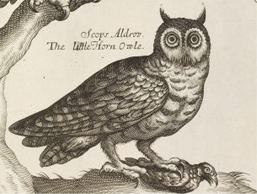
A seventeenth-century rendering of a little horn (or screech) owl.
A day conference on History Comes to Life: Seventeenth-Century Natural History, Medicine and the New Science‚ will be held on Friday 27 April 2012 from 9am to 5.30pm at The Royal Society in London. Organised by our industrious Martin Lister (1639-1712) Research Fellow Anna Marie Roos, and held to commemorate the 300th anniversary of Lister – Royal Physician and the first arachnologist and conchologist – the event will explore the often neglected relationship between medicine and natural history in the seventeenth-century. Featuring an exciting line-up of ten international authorities on early modern science, the meeting will dovetail out from Lister’s work to consider to what extent practices and technologies of natural history changed between the Renaissance and the seventeenth century. It will also explore how the acquisition of natural history knowledge and new schemes of taxonomy influenced the perception and treatment of animals for medical and experimental use. As well as support from Cultures of Knowledge, the conference is sponsored by The John Fell Fund, The British Society for the History of Science, The Royal Society, and the Wellcome Trust. The conference fee is a bargain at £40 (full price) or £30 (student/unwaged). For further details and to register online, please visit the conference webpage. Please address queries to felicity.henderson(at)royalsociety.org.
In exciting news for scholars of the Moravian educator and CofK stalwart Jan Amos Comenius, two Comenius-related publications prepared by colleagues and partners at the Czech Academy of Sciences have recently been released:
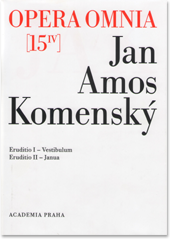 The new volume of J. A. Comenii Opera Omnia, 15/IV, appeared with Academia (Prague) in November 2011. Prepared by Martin Steiner, Markéta Klosová, and others, the volume builds on three installments already published under 15 and continues the ongoing work of the Opera Didactia Omnia corpus. The edition encompasses a significant part of Comenius’s activities in Hungary, including complete versions of textbooks prepared for the first two classes of his Latin school, and includes a full editorial apparatus as well as notes, comments, and summaries of information on edited works already available in English. For further information and to order a copy, please visit the publisher’s website.
The new volume of J. A. Comenii Opera Omnia, 15/IV, appeared with Academia (Prague) in November 2011. Prepared by Martin Steiner, Markéta Klosová, and others, the volume builds on three installments already published under 15 and continues the ongoing work of the Opera Didactia Omnia corpus. The edition encompasses a significant part of Comenius’s activities in Hungary, including complete versions of textbooks prepared for the first two classes of his Latin school, and includes a full editorial apparatus as well as notes, comments, and summaries of information on edited works already available in English. For further information and to order a copy, please visit the publisher’s website.
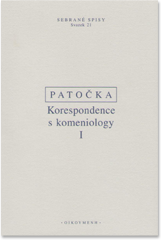 The letters of Jan Patočka, prepared by Věra Schifferová, have also been released in two volumes (1931-77) by Oikoymenh. A leading Czech philosopher of the twentieth century, Patočka was an eminent interpreter of Comenius’s life and work who corresponded extensively with other students of the pedagogue worldwide such as Milada Blekastad, Stanislav Sousedík, Julie Nováková, Jiřina Popelová, Josef Brambora, Antonín Škarka, Dmytro Čyževskyj, Klaus Schaller, Marcelle Denis, Franz Hofmann, and George Henry Turnbull. The letters, published in Czech, shed important light on Comenius as well as on the evolution of scholarly attitudes towards him. For further information and to order a copy, please visit the publisher’s website.
The letters of Jan Patočka, prepared by Věra Schifferová, have also been released in two volumes (1931-77) by Oikoymenh. A leading Czech philosopher of the twentieth century, Patočka was an eminent interpreter of Comenius’s life and work who corresponded extensively with other students of the pedagogue worldwide such as Milada Blekastad, Stanislav Sousedík, Julie Nováková, Jiřina Popelová, Josef Brambora, Antonín Škarka, Dmytro Čyževskyj, Klaus Schaller, Marcelle Denis, Franz Hofmann, and George Henry Turnbull. The letters, published in Czech, shed important light on Comenius as well as on the evolution of scholarly attitudes towards him. For further information and to order a copy, please visit the publisher’s website.
The Scaliger Institute and Brill publishers invite scholars and researchers to submit proposals for the 2012 Brill Fellowship at the Scaliger Institute of Leiden University Library. Brill, the oldest scholarly publishing house in The Netherlands based in Leiden since 1683, is sponsoring the Scaliger Institute from the year 2006 onwards. This contribution provides an opportunity for one or two fellows to come to Leiden University Library each year in order to carry out research in the library’s rich Special Collections. The Brill fellowship is intended for a minimum period of three months and for a maximum period of six months. The allowance, which is intended to cover the costs of accommodation and research, is €1,000 per month. Applications can be submitted by mail and post to the board of the Brill fellowship. The prospective fellow must be involved in one of Brill’s main subject areas: Middle East and Islamic Studies; Asian Studies; Medieval and Early Modern History; Biblical and Religious Studies; Ancient Near East and Egypt and Classical Studies. The Brill fellow is expected to contribute to the activities of the Scaliger Institute and to give a public lecture. When the occasion arises, the lecture will be published by Brill in association with the Scaliger Institute. The closing date for applications is 31 January 2012. For further details and application instructions, please visit the Fellowship webpage.
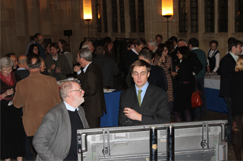
EMLO screenshots captivate the crowd.
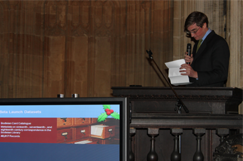
Chris Fletcher sets the scene.
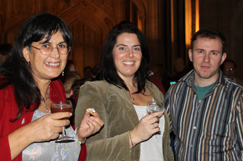
Festive designers and programmers.
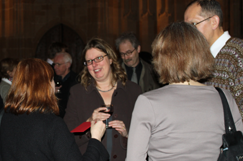
The Lister and Lhwyd research teams.
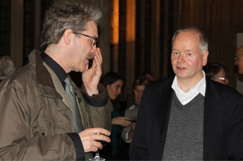
Stephen Clucas and Philip Beeley.
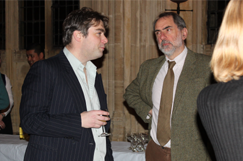
Will Poole and Richard Sharpe.
After a very busy year in private alpha, the Project celebrated the imminent public beta launch of our free union catalogue – Early Modern Letters Online − with a festive reception last Friday. Over eighty students, scholars, librarians, and digital humanists joined us in the historic environment of the Bodleian Library‘s Divinity School, where – over mulled wine, seasonal canapés, and mince pies – they were treated to contextual remarks from Dr Chris Fletcher (Keeper of Special Collections) and Professor Howard Hotson (Director of Cofk), and a full demonstration of the capabilities of the catalogue’s search and discovery, and editorial, interfaces by Project Coordinator Dr James Brown. Many thanks to everyone who contributed to the success of the evening, with a special shout-out to the Bodleian’s Wilma Minty for arranging things with her usual flair.
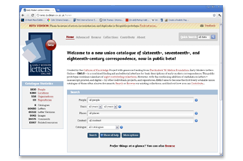
The EMLO homepage.
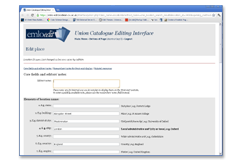
EMLO Edit, the editorial interface.
Early Modern Letters Online – which currently contains 60,480 epistolary records – federates basic metadata from eight contributing sources (including 48,695 sixteenth-, seventeenth-, and eighteenth-century records drawn from the existing card index of correspondence in the Bodleian Library), and allows for their manipulation and further enhancement by means of a sophisticated editorial environment. It will be available to the public from early January 2012.

 To stay informed, please watch this space or join the Mailing List. In the meantime, we wish you all a very Happy Holidays!
To stay informed, please watch this space or join the Mailing List. In the meantime, we wish you all a very Happy Holidays!
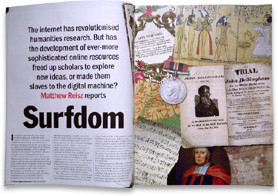 Cultures of Knowledge was featured in a THE survey of digital humanities projects last week. CofK was interviewed alongside staff from the Digital Miscellanies Index, the Old Bailey Online, Linguistic Geographies: The Gough Map of Great Britain, DigiPal, Ancient Lives, the Online Chopin Varorium Edition, and the DIAMM. Here’s how the article described the Project:
Cultures of Knowledge was featured in a THE survey of digital humanities projects last week. CofK was interviewed alongside staff from the Digital Miscellanies Index, the Old Bailey Online, Linguistic Geographies: The Gough Map of Great Britain, DigiPal, Ancient Lives, the Online Chopin Varorium Edition, and the DIAMM. Here’s how the article described the Project:
‘A remarkable project titled Cultures of Knowledge: An Intellectual Geography of the Seventeenth-Century Republic of Letters seeks to reconstruct pan-European intellectual networks by creating a modern equivalent. Many leading thinkers of the time were forced by war to flee from their homes and so left their papers all over the Continent. The digital revolution and the collapse of the Soviet Union, says Howard Hotson, professor of early modern intellectual history at the University of Oxford, have enabled a team based in Oxford (with support from the Andrew W. Mellon Foundation) to build ‘radically multinational forms of international collaboration of a kind which was effectively impossible before’, so as to reassemble in virtual form long-scattered learned correspondences. The project should transform the study of topics such as the Scientific Revolution…’
The article – mischievously entitled ‘Surfdom’ – goes on to raise some important caveats about electronic forms of humanistic research, even though for most digital projects these will serve as reminders of pitfalls and best practice rather than highlights of new or emerging issues. The emphasis on the necessity of crafting digital tools both in the service of research questions and alongside more conventional modes of scholarship is very much up our street as a full-spectrum academic enterprise, while some of the author’s concerns regarding the accessibility, sustainability, and especially accountability of large-scale online resources are also well-taken. Here’s the article; there’s a lively debate in the comments section and on Twitter.
 The second annual Anglo-French Conference on Scientific Communication and its History will take place in Paris at the Ecole Normale Supérieure on 9–10 March 2012. The conference will explore how technological developments – from the invention of printing with movable type to the postal network, from the railway timetable to the electric telegraph, from the telephone to e-mail – have profoundly influenced the nature of scientific communication and the structure and practice of science. It will bring together scientists, historians, social scientists, and science communicators to explore the role of technologies, both physical and social, in the history and present practice of communication within and around scientific communities and between science and its various publics. The conference will be organised around four themes: print and text; correspondence; networks and gatherings; and non-print media. In each of these it will explore the interaction between technical change and communicative practice by considering examples taken from across a wide range of historical conjunctures and disciplines. Papers should be thirty minutes in length, and should fall within one of the four themes. Doctoral students are invited to give fifteen-minute papers. The deadline for 300-word proposals is 15 January 2012. For further details and submission instructions, please download the conference flyer (pdf).
The second annual Anglo-French Conference on Scientific Communication and its History will take place in Paris at the Ecole Normale Supérieure on 9–10 March 2012. The conference will explore how technological developments – from the invention of printing with movable type to the postal network, from the railway timetable to the electric telegraph, from the telephone to e-mail – have profoundly influenced the nature of scientific communication and the structure and practice of science. It will bring together scientists, historians, social scientists, and science communicators to explore the role of technologies, both physical and social, in the history and present practice of communication within and around scientific communities and between science and its various publics. The conference will be organised around four themes: print and text; correspondence; networks and gatherings; and non-print media. In each of these it will explore the interaction between technical change and communicative practice by considering examples taken from across a wide range of historical conjunctures and disciplines. Papers should be thirty minutes in length, and should fall within one of the four themes. Doctoral students are invited to give fifteen-minute papers. The deadline for 300-word proposals is 15 January 2012. For further details and submission instructions, please download the conference flyer (pdf).













 To stay informed, please
To stay informed, please 
 The second annual Anglo-French Conference on Scientific Communication and its History will take place in Paris at the
The second annual Anglo-French Conference on Scientific Communication and its History will take place in Paris at the 
 Join
Join 